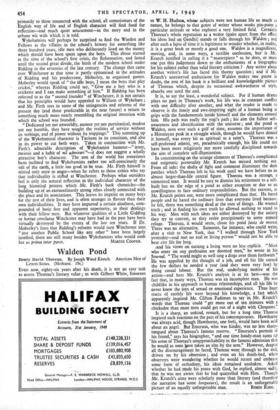Walden Pond
Henry David Thoreau. By Joseph Wood Krutch. American Men of Letters Series. (Methuen. 15s.)
EVEN now, eighty-six years after his death, it is not an easy task to assess Thoreau's literary value ; as with Gilbert White, Emerson
or W. H. Hudsem, whose subjects were not human life so much as nature, he belongs to that genre of writer whose works pin-point a particular attitude or who explores a very limited field. Certainly Thoreau's whole reputation as a writer (quite apart from the effect his ideas had on Gandhi) stands or falls through his Walden ; and after such a lapse of time it is legitimate to wonder whether, in reality, it is a great book or merely a good one. Walden is a magnificent, moving, and, in some ways, a terrible confession, but. is Mr. Krutch justified in calling it a " masterpiece " as he does, or must one put this judgement down to the enthusiasms of a biographer for his subject rather than valid literary criticism ? Any writer about another writer's life has faced this thorny question ; and if Mr. Krutch's unreserved enthusiasm for Walden makes one pause in doubt, the rest of his book is a brilliant and knowledgeable picture of Thoreau which, despite its occasional awkwardness of style, absorbs one until the end.
It is, to say the least, a wonderful subject. For if human drama plays no part in Thoreau's work, his life was in constant conflict with one difficulty after another, and what the reader is made to observe is the lonely and awe-inspiring sight of a human being at grips with the fundamentals inside himself and the elements around him. His path was really the yogi's path ; his aim the fullest self- awareness and identification with the universe ; and the pond at Walden, seen over such a gulf of time, assumes the importance of a Himalayan peak in a struggle which, though he would have denied it himself, was every bit as spiritual as a saint's. Thoreau was a self-professed atheist, yet, paradoxically enough, his life could not have been more religiously nor more carefully disciplined towards the aim of complete self-illumination.
In concentrating on the strange elements of Thoreau's complicated and enigmatic personality Mr. Krutch has missed nothing out. From all sides the shafts of light and comment illuminate the dark patches which Thoreau left in his work until we have before us an almost larger-than-life central figure. Thoreau was a strange, a tormented man. It would be easy to dismiss his retirement to a self- built but on the edge of a pond as either escapism or due to an unwillingness to face ordinary responsibilities. But the reasons, as Mr. Krutch points out, were more complicated than that. He hated people and he hated the ordinary lives that everyone lived because, he felt, there was something dead at the core of things. - He wanted truth ; and in finding his own truth he allowed nothing to stand in his way. Men with such ideas are either destroyed by the society, they try to convert, or they retire precipitously to some remote refuge. Thoreau, it would seem, chose his pond faute de miewa There was no alternative. Someone, for instance, who could write, after a visit to New York, that " I walked through New York yesterday—and met no real or living person " would not be able to bear city life for long. rind his views on earning a living were no less explicit. " Most who enter on any profession are doomed men," he wrote in his journal. " The world might as well sing a dirge over them forthwith." He was appalled by the thought of a job, and all his life earned the few dollars he needed a year (and they were very few) by doing casual labour. But the real, underlying motive of his action—and here Mr. Krutch's analysis is at its best—was the fact that, in many ways, Thoreau was an incomplete man. He was childlike in his approach to human relationships, and all his life he never knew the joys of sexual or emotional experience. Thus huge tracts of earthly life were beyond his knowledge, a fact which apparently inspired Mr. Clifton Fadiman to say in Mr. Krutch's words that Thoreau could " get more out of ten minutes with a chickadee than most men could get out of a night with Cleopatra."
It is a sharp, an unkind, remark, but for a long time Thoreau inspired such reactions on the part of his contemporaries. Hawthorne was always acid, though Hawthorne, one feels, would have been acid about an angel. But Emerson, who was kinder, was no less sharp- tongued about Thoreau's famous reserve. " Emerson's portrait of his friend," says his biographer, " and one time handy-man sums up This sense of Thoreau's unapproachability in the famous admission that he would as soon have taken an elm by the arm." However, despite all the discouragement he faced, Thoreau went through to the end, driven on by his obsession ; and even on his death-bed, when observers were wondering whether he would recant and embrace some form of orthodoxy, his ideas remained unshaken. Asked whether he had made his peace with God, he replied, almost sadly, that he was not aware that he had quarrelled with Him. Though Mr. Krutch's aims were scholarly more than literary (and therefore the narrative has some longueurs), the result is an unforgettable
picture of an equally unforgettable man. ROBIN KING. :






































 Previous page
Previous page